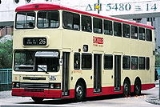
Dennis Dragon
Encyclopedia
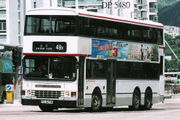
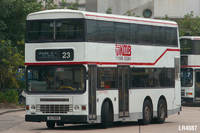
Dennis Specialist Vehicles
Dennis Specialist Vehicles is a major British coachbuilder and manufacturer of specialised commercial vehicles based in Guildford, England...
of the United Kingdom
United Kingdom
The United Kingdom of Great Britain and Northern IrelandIn the United Kingdom and Dependencies, other languages have been officially recognised as legitimate autochthonous languages under the European Charter for Regional or Minority Languages...
in the 1980s and 1990s.
The Dennis Dragon was named "Dragon" because they were designed for Kowloon Motor Bus
Kowloon Motor Bus
The Kowloon Motor Bus Company Limited , a company of the Transport International Holdings Limited, is the largest franchised bus operators in Hong Kong, and one of the largest privately owned public bus operators in the world...
. In Chinese, Kowloon
Kowloon
Kowloon is an urban area in Hong Kong comprising the Kowloon Peninsula and New Kowloon. It is bordered by the Lei Yue Mun strait in the east, Mei Foo Sun Chuen and Stonecutter's Island in the west, Tate's Cairn and Lion Rock in the north, and Victoria Harbour in the south. It had a population of...
means "nine dragons" and it is an area in Hong Kong, so the name "Condor" was adopted for China Motor Bus's "Dragons" to avoid "naming for an opponent company".
Design
The Dennis Dragon/Condor chassis was developed from 2-axle Dennis DominatorDennis Dominator
The Dennis Dominator was Dennis's first rear-engined double-decker bus chassis, it was launched in 1977. Dennis had been absent from the bus manufacturing market since the last Lolines were produced in 1967. The Dominator was described as bespoke, with numerous options...
, with two separate wheels fitted in front of the rear axle (auxiliary axle was fitted since 1986). It could be fitted with Gardner or Cummins
Cummins
Cummins Inc. is a Fortune 500 corporation that designs, manufactures, distributes and services engines and related technologies, including fuel systems, controls, air handling, filtration, emission control and electrical power generation systems...
engine (the Cummins engine was initially available as an option, but it gradually replaced the Gardner engine as standard), coupled to a Voith
Voith
The Voith GmbH, which is headquartered in Germany, is a family-run corporation in the mechanical engineering sector with worldwide operations....
or ZF
ZF Friedrichshafen
ZF Friedrichshafen AG, also known as ZF Group, and commonly abbreviated to ZF, is a German public company headquartered in Friedrichshafen, in the south-west German region of Baden-Württemberg....
gearbox.
All Dennis Dragons/Condors, except four out of five prototypes, were bodied with Duple Metsec
Duple Metsec
Duple Metsec is a former bus bodywork builder based in West Midlands of the United Kingdom, which usually supplied body kits for assembly overseas....
bodywork. In Hong Kong
Hong Kong
Hong Kong is one of two Special Administrative Regions of the People's Republic of China , the other being Macau. A city-state situated on China's south coast and enclosed by the Pearl River Delta and South China Sea, it is renowned for its expansive skyline and deep natural harbour...
, this makes Dennis Dragon/Condor easy to differentiate because most of the other bus models at the same period (such as Leyland Olympian
Leyland Olympian
The Leyland Olympian was a double-decker bus built by British Leyland/Leyland Bus in the United Kingdom from 1980 to 1993. It was the last Leyland bus model in production before the demise of Leyland Bus.-Construction:...
, Volvo Olympian
Volvo Olympian
The Volvo Olympian was a rear-engine double decker bus built by Volvo at Irvine, North Ayrshire, Scotland. It was first built in 1992 and entered production in March 1993, replacing the Leyland Olympian....
, Scania N113
Scania N113
The Scania N113 was a transverse-engined bus chassis built by Scania AB of Sweden between 1988 and 2000.Like its predecessor, the N112, the N113 had an 11-litre engine mounted at the rear, coupled to either a Scania or Voith gearbox...
, etc.) were bodied with Alexander
Walter Alexander Coachbuilders
Walter Alexander Coachbuilders was a Scottish bus coachbuilder and operater based in Falkirk.-History:Walter Alexander, notice a lack expasion by the Falkirk and District Tramways Company's especially in to Grangemouth which never hdd a tram line. In 1913 Alexander's Motor Service was created to...
bodywork.
Kowloon Motor Bus
In 1982, Kowloon Motor BusKowloon Motor Bus
The Kowloon Motor Bus Company Limited , a company of the Transport International Holdings Limited, is the largest franchised bus operators in Hong Kong, and one of the largest privately owned public bus operators in the world...
bought three 12 m non air-conditioned Dennis Dragons (fleet code: 3N) with Alexander bodywork for evaluation. After that, KMB bought 188 more 12 m Dennis Dragon, but all of these buses were bodied with Duple Metsec bodywork and had 3 doors (1 for boarding and 2 for alighting).
In 1986, KMB started to buy 11 m non air-conditioned version of Dennis Dragon (fleet code: S3N) for the bus services of New Territories
New Territories
New Territories is one of the three main regions of Hong Kong, alongside Hong Kong Island and the Kowloon Peninsula. It makes up 86.2% of Hong Kong's territory. Historically, it is the region described in The Convention for the Extension of Hong Kong Territory...
. Between 1986 and 1994, KMB introduced totally 370 of 11 m non air-conditioned buses; all of them had Duple Metsec bodywork. 50 of them had a closed back, which was originally reserved for installation of air-conditioner but KMB did not install air-conditioner to these buses.
In 1990, KMB bought an 11 m air-conditioned Dennis Dragon (fleet code: AD) for testing. In following years up to 1999, KMB introduced totally 765 air-conditioned Dennis Dragons, including 235 of 9.9 m buses (fleet code: ADS), 360 of 11 m buses and 170 of 12 m buses (fleet code: 3AD).
Due to modernisation of KMB fleet, all KMB's 12 m non air-conditioned Dragons, 320 11m non air-conditioned Dragons and 131 11 m air-conditioned Dragon had been withdrawn (KMB still keeps several 12 m non air-conditioned Dragons as driver training buses). On the other hand, KMB had two 12 m air-conditioned Dennis Dragons (3AD46 and 3AD80), four 11 m air-conditioned Dennis Dragons (AD2, AD7, AD35 and AD266) and two 9.9 m air-conditioned Dennis Dragon (ADS94 and ADS174) prematurely withdrawn due to accident damage.
China Motor Bus

China Motor Bus
China Motor Bus Company Ltd. , often abbreviated as CMB, was the first motor bus company in Hong Kong, and was responsible for the introduction of double-decker buses to Hong Kong Island....
received two 12 m non air-conditioned Dennis Condors for evaluation, one of them was fitted with Duple Metsec bodywork, and the other one with Alexander bodywork.
Because of the opening of MTR
MTR
Mass Transit Railway is the rapid transit railway system in Hong Kong. Originally opened in 1979, the system now includes 211.6 km of rail with 155 stations, including 86 railway stations and 69 light rail stops...
's Island Line
Island Line (MTR)
The Island Line is one of 10 lines of the MTR, the mass transit system in Hong Kong. It runs from Sheung Wan in the Central and Western District to Chai Wan in the Eastern District. The line first opened in 31 May 1985...
in 1980s, CMB didn't buy many Dennis Condors. Between 1989 and 1997, CMB bought only 46 12m non air-conditioned Condors, 28 11m non air-conditioned Condors and 92 11m air-conditioned Condors. It is rumoured that CMB's last ten air-conditioned Condors were bought due to unpredictable delivery time of the Dennis Tridents ordered. All the CMB's Dennis Condors were sold to New World First Bus
New World First Bus
New World First Bus Services Limited , abbreviated as First Bus and "NWFB", is the third largest public bus operator in Hong Kong.NWFB was established in 1998, taking over China Motor Bus's franchise on 1 September 1998 to provide bus services on Hong Kong Island together with Citybus...
when CMB lost its franchise in 1998, three of the 12 m Condors were subsequently converted to training bus.
In 1999, NWFB converted one 11 m Dennis Condor (fleet number DM6) to open top and allocated the bus to route 15C in early 2000, it was superseded by an air-conditioned Dennis Condor on 25 January 2008 which was newly converted to open-top (fleet number DA66). Other non air-conditioned Dennis Condors were retired by August 2002 and sold out, with an 11 m non air-conditioned Dennis Condor (fleet number DM28) regarded by NWFB as its last "hot dog" ("hot dog" is a nickname non air-conditioned buses in Hong Kong). A number of 12 m Dennis Condors were shipped back to the UK for further service, and some 11 m ones were sold to New World First Travel (as open-top buses, later sold to Citybus
Citybus (Hong Kong)
Citybus Limited is one of the three major bus operators in Hong Kong. It provides both franchised and non-franchised bus service. The franchised route network serves mainly Hong Kong Island, cross-harbour routes , Ocean Park, North Lantau and Hong Kong International Airport...
) and Citybus (as training buses). A few Dennis Condors were sold for preservation, DL1 & DL2 were sold to private preservationists in Hong Kong, while DM17 was sold to 3 preservationists in the UK.
Some of the air conditioned Dennis Condors had been withdrawn by NWFB and many were sold for further service.
Citybus
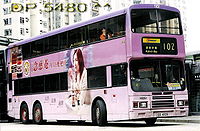
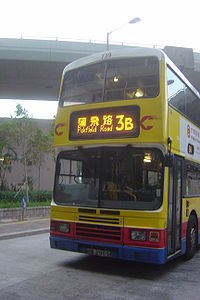
Citybus (Hong Kong)
Citybus Limited is one of the three major bus operators in Hong Kong. It provides both franchised and non-franchised bus service. The franchised route network serves mainly Hong Kong Island, cross-harbour routes , Ocean Park, North Lantau and Hong Kong International Airport...
started to order air-conditioned Dennis Dragon in 1993. The Duple Metsec bodywork for Citybus's Dragons, which were assembled by Salvador Caetano
Salvador Caetano
Grupo Salvador Caetano, SGPS, SA is a Portuguese holding based in Vila Nova de Gaia, Portugal that controls some enterprises on vehicle assembly, components and distribution business....
in Portugal
Portugal
Portugal , officially the Portuguese Republic is a country situated in southwestern Europe on the Iberian Peninsula. Portugal is the westernmost country of Europe, and is bordered by the Atlantic Ocean to the West and South and by Spain to the North and East. The Atlantic archipelagos of the...
, were different from those supplied to KMB/CMB in that the frontal design resembled with those used on Alexander R-type and a wider front door was used.
Between 1994 and 1998, Citybus introduced 80 12m Dennis Dragon and 40 10.3m Dennis Dragon. In 2000, Citybus rebuilt a 10.3 m Dragon (fleet number 701) as the world's first 3-axle double-deck air-conditioned trolleybus
Trolleybus
A trolleybus is an electric bus that draws its electricity from overhead wires using spring-loaded trolley poles. Two wires and poles are required to complete the electrical circuit...
.
One of Citybus's 10.3 m Dennis Dragon (fleet number 713) had been prematurely withdrawn in 2002 due to fire damage.
HACTL
In early 1996, Hong Kong Air Cargo Terminals LimitedHong Kong Air Cargo Terminals Limited
Hong Kong Air Cargo Terminals Limited is one of the leading air cargo terminal operator in the world. Located at the Hong Kong International Airport, it handles a total throughput of 2,899,603 tonnes of cargo per year which was about 80% air cargo processing capacity of the Hong Kong International...
(HACTL) received four Dennis Dragons for use as staff buses. They were similar with Citybus's 12-metre Dragon in appearance but with no route indicators and narrower seats were fitted so as to increase the seating capacity.
All these buses were acquired by New World First Bus after HACTL ceased to operate its staff bus routes in September 1999. They re-entered service in 2000.
Africa
In 1992, StagecoachStagecoach Group
Stagecoach Group plc is an international transport group operating buses, trains, trams, express coaches and ferries. The group was founded in 1980 by the current chairman, Sir Brian Souter, his sister, Ann Gloag, and her former husband Robin...
introduced ten Dennis Dragons in Malawi
Malawi
The Republic of Malawi is a landlocked country in southeast Africa that was formerly known as Nyasaland. It is bordered by Zambia to the northwest, Tanzania to the northeast, and Mozambique on the east, south and west. The country is separated from Tanzania and Mozambique by Lake Malawi. Its size...
. The company also introduced twenty Dennis Dragons in Kenya
Kenya
Kenya , officially known as the Republic of Kenya, is a country in East Africa that lies on the equator, with the Indian Ocean to its south-east...
between 1995 and 1996.
Later, all the Dennis Dragons in Kenya were shipped back to the UK and were allocated to Stagecoach Manchester for their low fares Magic Bus fleet. They re-entered service between 1998 and 2000 where they would stay in service with the company until 2010.
Replacement
After finishing the last orders, the Dennis Dragon was finally superseded by low-floor Dennis Trident 3Dennis Trident 3
Dennis Trident 3 is the first low floor double-decker bus chassis built by Dennis in the United Kingdom, with a large number purchased by bus companies in Hong Kong, Singapore, the United States and Canada.-Design:...
in 1997.

